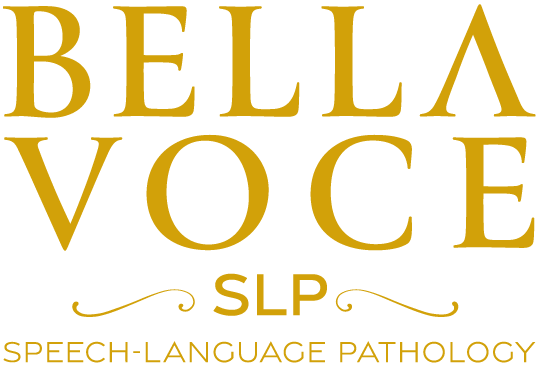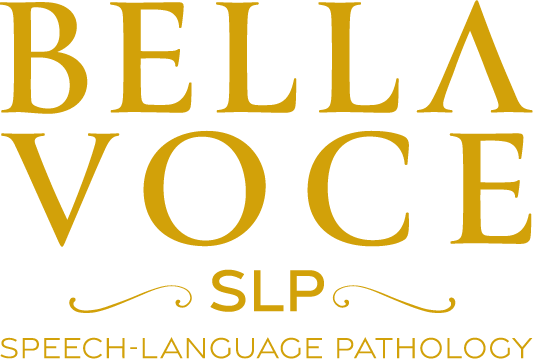
Frequently Asked Questions
How much of my child’s speech should I and others be able to understand at this age?
Typically, a child should be 100% intelligible to unfamiliar listeners by age 4 years old. For younger children, unfamiliar listeners should be able to understand roughly 25% age 1, 50% by age 2, and 75% by age 3.
What is the difference between speech therapy and language therapy?
Speech therapy refers to working on speech sounds (e.g. How is the /r/ sound produced?) while language therapy refers to working on how a person comprehends language (receptive language) and uses language to express themselves (expressive language).
The general term “speech therapy” is often used as an umbrella term to refer to the therapy services provided by an SLP. Through the evaluation process, we will decide what type of “speech therapy” you or your child need. This could include speech sound intervention, voice therapy, intervention for stuttering, executive function training, social skills training, language intervention, or literacy support.
What are executive function skills?
Also known as “soft skills”, executive function skills are a learned set of skills crucial to overall learning and development, and helping people make healthy choices. These skills include initiation (beginning a task or activity), sustaining and shifting focus (attention), planning and organizing, problem-solving, impulse control and self-monitoring, working memory (the ability to remember information and do something with it like read, write, or complete math problems), emotional regulation (the ability to manage emotions), and cognitive flexibility (the ability to think and behave flexibly). Sustaining effort and processing speed are also included in this area.
It is common for autistic individuals or people with ADHD to have difficulty with executive function skills. However, some people may present with executive functioning difficulties without having those diagnoses.
Why should my child see an SLP for reading difficulties/dyslexia instead of a tutor?
SLPs are uniquely qualified to work on literacy due to their extensive knowledge in language development and understanding of foundational blocks required to become a fluent reader. Additionally, SLPs are knowledgeable in morphology (sound prefixes and suffixes), syntax (grammar), phonology (knowledge of speech sounds), semantics (word meaning/vocabulary), pragmatics (social use of language including perspective taking and theory of mind), and executive function skills, which are crucial for fluent reading, reading comprehension, and written expression.
What is ADHD coaching?
ADHD coaching is a critical part of care for individuals living with ADHD. While medication can help an individual with alertness and focus, medication does not explicitly teach executive function skills and strategies, necessary for navigating life. Medication is like an internal set of glasses, helping to make it easier for an individual to learn and regulate. Because individuals with ADHD struggle with executive function skills, they often present with difficulty in transitions, time sense/time management, being organized, processing information the first time, working memory (where we temporarily store, retain, and manipulate information), emotional regulation, and/or performance consistency. ADHD coaching is a unique, tailored support to help individuals with ADHD learn tips and tricks to help manage their challenges and use their strengths to feel more successful.
What is Neurodivergent Affirmative Care?
Neurodivergent affirmative care (NAC) is a model of care that accepts and celebrates differences in brain function and structure as a natural variation of the human experience. It's based on the idea that there's no single "normal" or "better" neurological profile, and that people with diverse neurological characteristics should be accepted, understood, and supported.
NAC is appropriate for everyone, but is most commonly used and discussed in relation to autistic people and individuals with ADHD. NAC is based on the following principles:
· Embrace differences: NAC recognizes that differences in brain function and structure are natural and valid, and that people should be accepted just the way they are.
· Focus on strengths: NAC uses a strength-based approach, rather than a deficit-based approach.
· Support quality of life: NAC focuses on increasing a person's quality of life, rather than trying to fit them into a standard mold.
· Avoid expectations: NAC avoids expecting people to perform at the same level as those without neurological differences.
· Respect boundaries: NAC teaches people how to establish and maintain their personal boundaries, and to respect the boundaries of others.
What is gender affirming voice therapy?
Gender affirming voice therapy is a type of speech therapy that helps people who are transgender or non-binary align their voice and communication with their gender identity. It can help people feel more comfortable and confident in their interactions with others.
What is accent modification?
Accent modification, also known as accent reduction therapy, is a program that helps people learn to say words differently to improve their pronunciation and communication. People who speak English as a second language, people who want to change their regional accent, and professionals who want to communicate better at work may pursue accent modification therapy. An SLP can help with accent modification by analyzing a person's individual patterns and creating a tailored plan.
Where is your clinic? How do you provide services?
Bella Voce is located in Santa Barbara, CA. All services are offered in-person in the comfort of your home, at your child’s school OR via teletherapy. There is no travel fee for in-person services for clients living in Summerland, Montecito, Santa Barbara or Goleta, CA. Contact us to inquire about travel fees outside of those areas.
Alternatively, teletherapy is another convenient option and is offered for most clients living in California, Arizona, and Washington states. If your state is not listed and you are interested in working with Bella Voce via teletherapy, please send us an email.
What areas of communication do you evaluate?
Private evaluations can be catered to your concerns. They can include speech sound production (articulation), fluency (stuttering), voice, expressive and/or receptive language, social communication, and/or literacy (reading). Not sure what’s needed? Contact us! Bella Voce offers a FREE 30 minute consultation. We can discuss your concerns and needs, and make a recommendation.
My child’s school district has granted an Independent Education Evaluation (IEE). Do you complete IEEs? What areas do you evaluate?
An Independent Education Evaluation (IEE) is an assessment completed by a qualified examiner outside of the public school system. An IEE can be thought of as a second opinion in the development of your child’s IEP (Individual Education Plan), either to pursue different accommodations or to overturn the school district’s decision about services. Parents and guardians can request an IEE for their child through the school district if they disagree with the findings of the evaluation administered by the school district.
An IEE in communication includes assessment in all areas of communication (e.g. speech, receptive, expressive and pragmatic language, voice, fluency/stuttering, and prosody) via standardized and non-standardized measures, parent/client interview, in-school observation of your child, written report and up to 2 hours of attendance at the IEP meeting to review the assessment with the school team (arrangement for additional IEP attendance time can be made). Although literacy is generally not assessed and treated by an SLP in the public school setting, a reading assessment and recommendations to the school team can be provided by an SLP in the private sector. As part of the IEE, literacy assessments can be included as part of a communication assessment or administered as a stand-alone assessment. Given Mia’s vast experience as an SLP in the public schools with various IEP teams, literacy training, and experience as an ADHD professional and neurodivergent affirmative therapist, Mia is uniquely qualified to make recommendations to your child’s school team about your child’s needs.
What if I am unsure if I should schedule therapy or an evaluation?
Contact us! Bella Voce offers a FREE 30 minute consultation. We can discuss your concerns and needs, and make a recommendation.
Do you accept health insurance?
Bella Voce does not accept health insurance. A superbill can be provided to submit to your insurance as an out of network provider. Please contact your insurance provider to inquire about out of network coverage for developmental speech therapy for children or rehabilitative speech therapy for adults. Gender affirming voice therapy may be included under gender affirming care benefits. Bella Voce accepts payment via cash, Zelle, Credit Card, Debit Card, and HSA/FSA plans.
Inquire
Phone: 805-871-4452
Call or text us to book an appointment or discuss your needs.
Email:
For general inquiries, you may also send us an email by filling out this form, and we’ll get back to you as soon as possible.

© 2024 Bella Voce
All Rights Reserved.
